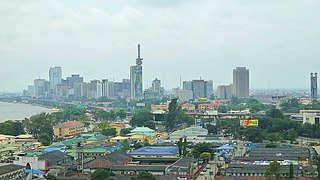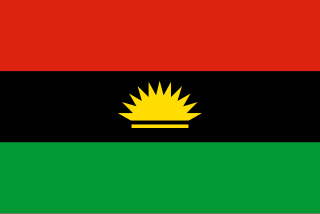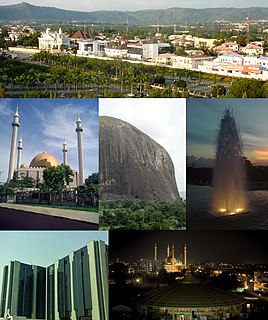
The federal government of Nigeria is composed of three distinct branches: legislative, executive, and judicial, whose powers are vested by the Constitution of Nigeria in the National Assembly, the President, and the federal courts, including the Supreme Court, respectively.

Nigeria is a middle-income, mixed economy and emerging market, with expanding manufacturing, financial, service, communications, technology and entertainment sectors. It is ranked as the 27th-largest economy in the world in terms of nominal GDP, and the 22nd-largest in terms of purchasing power parity. It is the largest economy in Africa; its re-emergent manufacturing sector became the largest on the continent in 2013, and it produces a large proportion of goods and services for the West African subcontinent. In addition, the debt-to-GDP ratio is 11 percent, which is 8 percent below the 2012 ratio.

Biafra, officially the Republic of Biafra, was a secessionist state in West Africa which existed from 30 May 1967 to January 1970; it was made up of the states in the Eastern Region of Nigeria.

Abuja is the capital city of Nigeria located in the centre of the country within the Federal Capital Territory (FCT). It is a planned city and was built mainly in the 1980s, replacing the country's most populous city of Lagos as the capital on 12 December 1991. Abuja's geography is defined by Aso Rock, a 400-metre (1,300 ft) monolith left by water erosion. The Presidential Complex, National Assembly, Supreme Court and much of the city extend to the south of the rock. Zuma Rock, a 792-metre (2,598 ft) monolith, lies just north of the city on the expressway to Kaduna.

Lagos is a city in the Nigerian state of Lagos. The city, with its adjoining conurbation, is the most populous in Nigeria and on the African continent. It is one of the fastest growing cities in the world and one of the most populous urban agglomerations. Lagos is a major financial centre in Africa; the megacity has the fourth-highest GDP in Africa and houses one of the largest and busiest seaports on the continent.

In Nigeria, a state is a federated political entity that shares sovereignty with the federal government. There are 36 states bound together by a federal agreement. The Federal Capital Territory is not a state and under the direct control of the federal government. The states are further divided into a total of 774 Local Government Areas. Under the Nigerian Constitution, states have the power to ratify constitutional amendments.

The Igbo people are an ethnic group native to the present-day south-central and southeastern Nigeria. There has been much speculation about the origins of the Igbo people, as it is unknown how exactly the group came to form. Geographically, the Igbo homeland is divided into two unequal sections by the Niger River – an eastern and a western section. The Igbo people are one of the largest ethnic groups in Africa.

Olusegun Mathew Okikiola Aremu Obasanjo, GCFR, Ph.D. (; Yoruba: Olúṣẹ́gun Ọbásanjọ́[olúʃɛ̙́ɡũ ɒ̙básandʒɒ̙́]; born 5 March 1937) is a former Nigerian Army general who was President of Nigeria from 1999 to 2007. Obasanjo was a career soldier before serving twice as his nation's head of state: He served as a military ruler from 13 February 1976 to 1 October 1979, and as a democratically elected president from 29 May 1999 to 29 May 2007. From July 2004 to January 2006, Obasanjo also served as Chairperson of the African Union.

The President of the Federal Republic of Nigeria is the head of state and head of government of the Federal Republic of Nigeria. The President of Nigeria is also the commander-in-chief of the Nigerian Armed Forces. The President is elected in national elections which take place every four years. The first President of Nigeria was Nnamdi Azikiwe, who took office on October 1, 1963. The current President, Muhammadu Buhari took office on May 29, 2015 as the 15th President of the Federal Republic of Nigeria.

Muhammadu Buhari is a Nigerian politician currently serving as the President of Nigeria, in office since 2015. He is a retired major general in the Nigerian Army and previously served as the nation's head of state from 31 December 1983 to 27 August 1985, after taking power in a military coup d'état. The term Buharism is ascribed to the Buhari military government.

The Nigerian Civil War, also known as the Biafran War and the Nigerian-Biafran War, was a war fought between the government of Nigeria and the secessionist state of Biafra. Biafra represented nationalist aspirations of the Biafran people, whose leadership felt they could no longer coexist with the Northern-dominated federal government. The conflict resulted from political, economic, ethnic, cultural and religious tensions which preceded Britain's formal decolonization of Nigeria from 1960 to 1963. Immediate causes of the war in 1966 included ethno-religious riots in Northern Nigeria, a military coup, a counter-coup and persecution of Igbo living in Northern Nigeria. Control over the lucrative oil production in the Niger Delta played a vital strategic role.
The Nigeria national football team, also known as the Super Eagles, represents Nigeria in international association football and is controlled by the Nigeria Football Federation (NFF). They are three-time Africa Cup of Nations winners, with their recent title in 2013, after defeating Burkina Faso in the final.

Borno, also known as Borno State, is a state in north-eastern Nigeria. Its capital is Maiduguri. The state was formed in 1976 from the split of the North-Eastern State. Until 1991 it contained what is now Yobe State. It is the homeland of the Kanuri people in Nigeria.

Goodluck Ebele Azikiwe Jonathan is a Nigerian politician who served as the President of Nigeria from 2010 to 2015. Prior to that he served as Vice-President of Nigeria from 2007 to 2010 and as Governor of Bayelsa State from 2005 to 2007.

Nigeria has 774 local government areas (L.G.As). Each local government area is administered by a Local Government Council consisting of a chairman who is the Chief Executive of the LGA, and other elected members who are referred to as Councillors. Each of the areas is further subdivided into wards with a minimum of ten and a maximum of fifteen for each area.

There are perhaps 500 languages spoken in Nigeria. The official language of Nigeria is English, the former language of colonial British Nigeria. As reported in 2003, Nigerian English and Nigerian Pidgin were spoken as a second language by 60 million people in Nigeria. Communication in the English language is much more popular in the country's urban communities than it is in the rural areas, due to colonisation.

Nigerians or the Nigerian people are citizens of Nigeria or people with ancestry from Nigeria. Nigeria is composed of multiple ethnic groups and cultures and the term Nigerian refers to a citizenship-based civic nationality. Nigerians derive from over 250 ethnic groups and languages. Though there are multiple ethnic groups in Nigeria, economic factors result in significant mobility of Nigerians of multiple ethnic and religious backgrounds to reside in territories in Nigeria that are outside their ethnic or religious background, resulting in the intermixing of the various ethnic and religious groups, especially in Nigeria's cities. The English language is the lingua franca of Nigerians. About 50 percent of Nigerians are Christians and the other 50 percent are Muslims.

The Islamic State in West Africa or the Islamic State's West Africa Province, formerly known as Jamā'at Ahl as-Sunnah lid-Da'wah wa'l-Jihād and commonly known as Boko Haram until March 2015, is a jihadist terrorist organization based in northeastern Nigeria, also active in Chad, Niger and northern Cameroon.

The Boko Haram insurgency began in 2009, when the jihadist group Boko Haram started an armed rebellion against the government of Nigeria. The conflict takes place within the context of long-standing issues of religious violence between Nigeria's Muslim and Christian communities, and the insurgents' ultimate aim is to establish an Islamic state in the region.
















